| |
| |
| |
| Presented By the U.S. Air Force Rapid Sustainment Office (RSO) |
| |
| Axios World |
| By Dave Lawler ·Oct 22, 2020 |
| Welcome back to Axios World. Tonight we're diving deep on arms control (1,550 words, 6 minutes). We'll be back to all the latest global happenings on Monday. - If you missed the first edition of Barak Ravid's brilliant "Axios from Tel Aviv" newsletter, read this scoop and sign up here.
- A personal note: A tweet from my colleague Bethany Allen-Ebrahimian today reminded me how lucky I am to have such kind, engaged readers. Thanks for reading, for your feedback and for spreading the word.
Just joining? Subscribe here. |
| |
| |
| 1 big thing: Russia's new nuclear proposal |
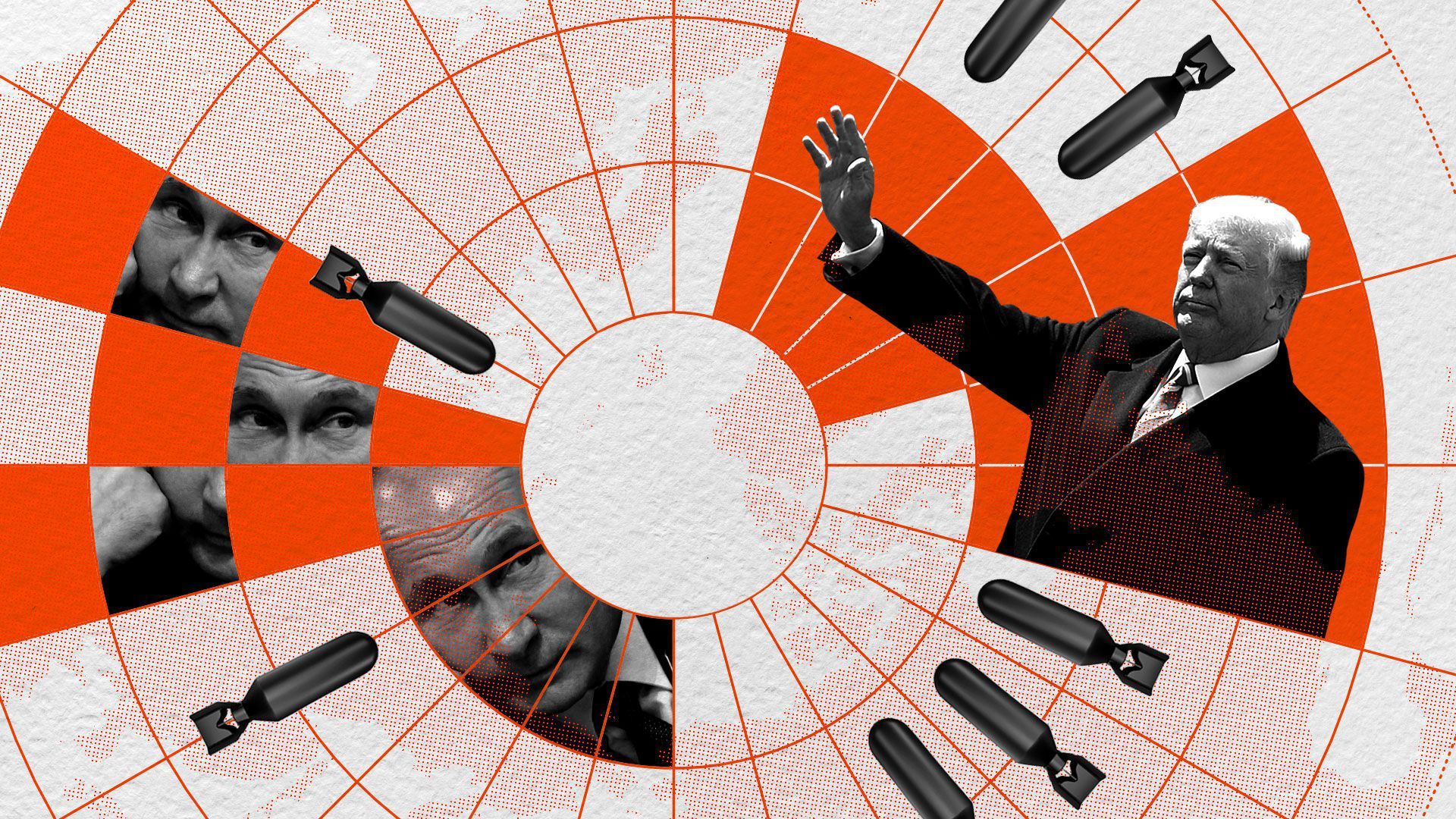 |
|
| Illustration: Lazaro Gamio/Axios |
| |
| A surprise offer from Vladimir Putin has the U.S. and Russia once again circling a potential pre-election nuclear deal. The big picture: The last treaty constraining the U.S. and Russia, New START, is due to expire on Feb. 5, 2021, two weeks after the next U.S. presidential inauguration. For the first time since the height of the Cold War, the nuclear guardrails could come off. - "The arms control architecture would practically cease to exist," EU arms control envoy Marjolijn van Deelen said today on a call hosted by the European Leadership Network (ELN).
- Both sides have warned that without a deal, they're prepared for an arms race.
While Joe Biden has said he'd extend New START if elected, the Trump administration has insisted it will only extend the Obama-era deal if Russia addresses its priorities — limiting all nuclear warheads and bringing China to the table. - U.S. arms control envoy Marshall Billingslea has repeatedly said the offer will expire on Election Day. After that, "our asking price will go up."
- Putin came in with an offer this week that was well below that asking price, but it closed enough of the gap that Billingslea pronounced a deal "very, very close."
Driving the news: Just days earlier, the White House had rejected a proposal from Putin — a one-year extension to allow for further negotiations — as a "non-starter." But on Tuesday, Russia added a surprise twist. - It was now prepared to "undertake a political commitment to 'freeze' ... the number of nuclear warheads that each side possesses" for a year, as long as the U.S. dropped all "additional demands."
- State Department spokesperson Morgan Ortagus quickly said the U.S. was "prepared to meet immediately to finalize a verifiable agreement," which a senior U.S. official told the WSJ could be reached within days.
Between the lines: That's where things get complicated. Russia hadn't said anything about the agreement being verifiable. - In fact, Billingslea's Russian counterpart, Sergei Ryabkov, today seemed to suggest it wouldn't be.
- Russia had simply agreed to "the concept of a nuclear warhead freeze — without additional appendages and requirements for Russia," he told Russia's Kommersant newspaper.
- Between the lines: "Russia, as a closed society, has always treated verification as a concession," notes Pranay Vaddi of the Carnegie Endowment.
The two sides also don't have a shared definition of what exactly would be frozen. - While New START limits the number of deployed warheads with which the U.S. and Russia could strike one another, it doesn't cap shorter-range systems or non-deployed warheads.
- A full accounting of all warheads has never been attempted.
Where things stand: Billingslea told "PBS Newshour" on Tuesday that any deal would "of course" have to include "effective verification." But he acknowledged that no agreement to that effect had been reached. The bottom line: That's leaves quite a bit of ground to cover in less than two weeks. |
    |
| |
| |
| 2. The view from Russia: Hedging its bets |
 |
|
| Photo Illustration: Eniola Odetunde/Axios. Photos: Mikhail Svetlov/Getty Images |
| |
| A deal only appears possible now because of the sudden "U-turn" from Putin, notes Elena Chernenko, who covers arms control for Kommersant. The backstory: Russia has long called for an unconditional extension of New START and insisted that any further negotiations also put Russian priorities like missile defense on the table. - Now the position has been changed — and not by negotiators in the Foreign Ministry, she reports. "This decision was taken in the Kremlin."
- It's the second significant concession from Moscow, after the agreement that New START be extended for only one year, rather than five.
What to watch: "Experts here in Russia were clearly surprised by this change of the position, because they see several possible traps for Russia in such a possible freeze," Chernenko said on the ELN call. - Any alleged violations of the freeze could be treated as grounds for U.S. sanctions, she says.
- Second, a potential Biden administration could insist that the freeze be the starting point for further negotiations, rather than a clean extension of New START.
Russia is "hedging its bets," says Gaukhar Mukhatzhanova of the Vienna Center for Disarmament and Non-Proliferation. - This deal would remove the risk of New START's imminent expiration and allow arms control talks with a possible Biden administration to start "from the very beginning," rather than with a scramble to extend the deal, she says.
The latest: Putin may also be hedging on his own commitments. - According to Bloomberg, he said today at the Valdai Forum in Moscow that New START should be extended "for a year, without preconditions" to allow for further negotiations.
- That sounds a lot like the position the U.S. already rejected.
|
    |
| |
| |
| 3. Three scenarios for the next two weeks |
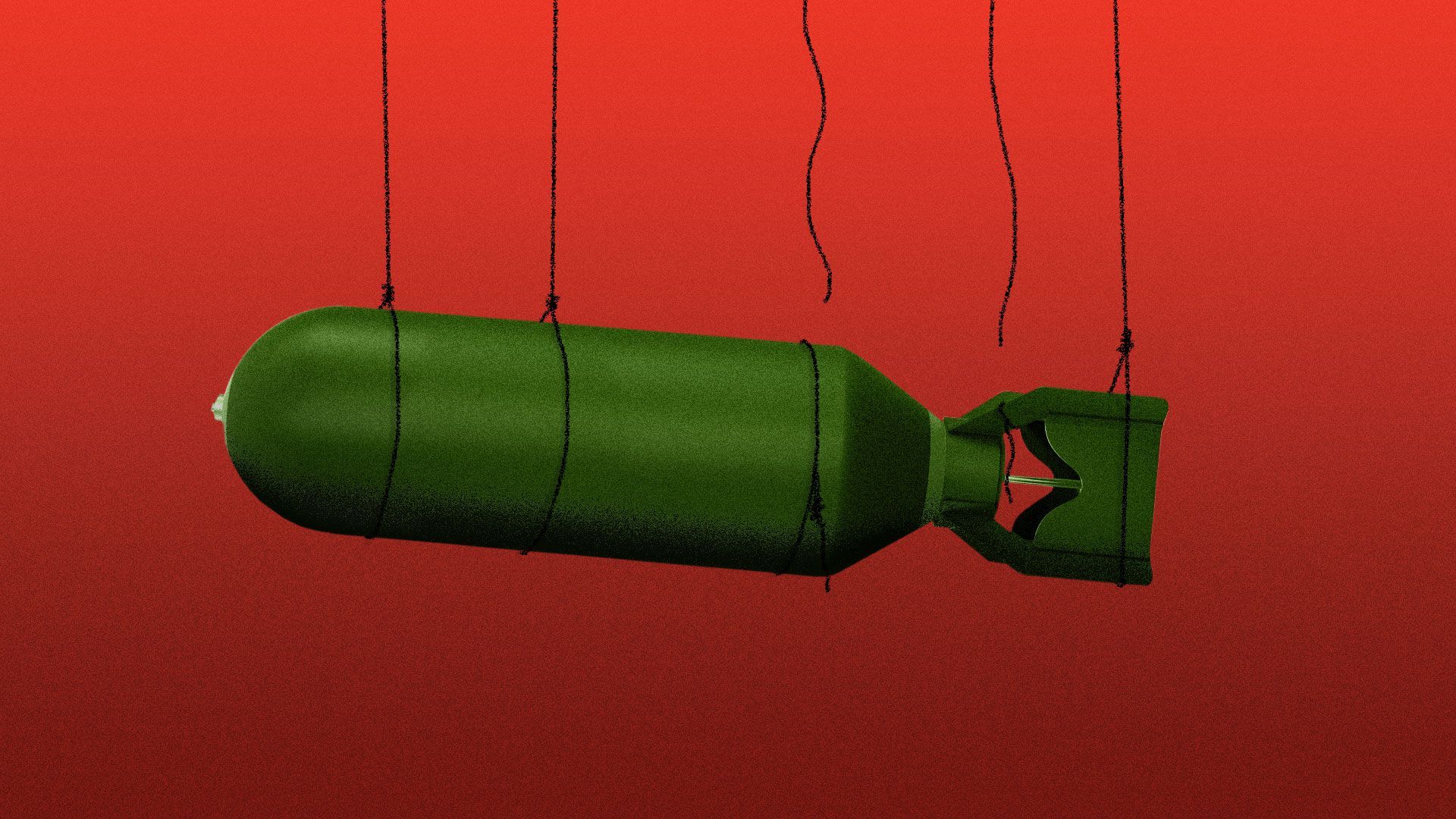 |
|
| Illustration: Aïda Amer/Axios |
| |
| James Acton, co-director of the Nuclear Policy Program at the Carnegie Endowment for International Peace, tells Axios there are three scenarios for how this could play out over the next two weeks: - No deal (for now).
- An agreement with no verification. Acton calls that the "Singapore scenario," referring to Trump's 2018 summit with Kim Jong-un. That's possible if Trump "just wants a deal and doesn't care about the details."
- An agreement with a "vague statement" on verification. The U.S. could spin that as a win, but it "won't actually commit the Russians to anything," he says.
Breaking it down: Any deal that can be reached by Nov. 3 will require "a pretty drastic fallback in the U.S. position," Vaddi says. - The U.S. has consistently demanded very strict verification for any deal, and just two months ago it was insisting that China take part in any nuclear negotiations.
- "There's been some shift in Trump's and Putin's views that gets them a little bit closer to an agreement," Vaddi says.
By offering proposals directly, Putin has now taken a more public role in this process than Trump. - "The single most important factor is how much Trump personally wants this," Acton says.
- "If he's not engaged, no deal is by far the most likely option. If he does care — if he is engaged and he wants something — I think it's highly likely you end up with something."
|
    |
| |
| |
| A message from the U.S. Air Force Rapid Sustainment Office (RSO) |
| Manufacturing gets its own Olympics |
| |
 |
| |
| The U.S. Air Force is hosting the inaugural Advanced Manufacturing Olympics today and tomorrow. The virtual event is bringing together a community of industry, academia and government professionals to collaborate, network and discuss transforming sustainment in the Air Force. Join now. |
| |
| |
| 4. What to watch: The "no deal" scenario |
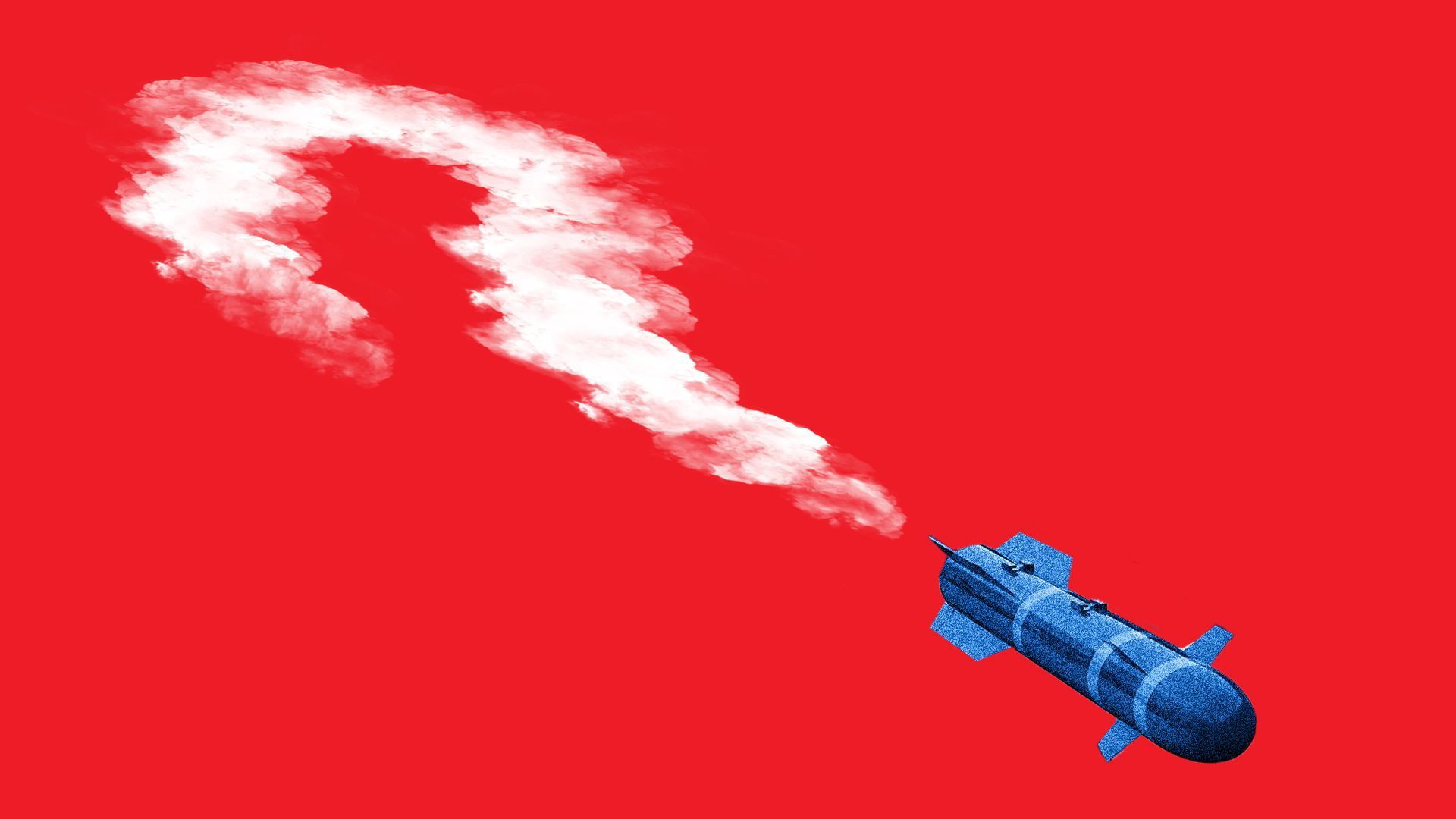 |
|
| Illustration: Rebecca Zisser/Axios |
| |
| While Billingslea has pushed for a deal before the election, he hasn't ruled out an agreement that would come together between Election Day and Feb. 5. Yes, but: The administration has ruled out a clean extension of New START. - "The New START treaty constrains 92% of the entire U.S. arsenal. ... It only covers 45% or less of the Russian arsenal," Billingslea contended in the PBS interview, referring to Russia's vast stockpile of smaller-range "tactical" nuclear weapons, which aren't covered in the treaty.
- "And of course, New START covers not a single Chinese warhead."
Billingslea denied that Biden's intention to extend New START reduced the Trump administration's leverage. - In fact, he claimed that Russia's willingness to countenance a warhead cap would actually force Biden to adopt Trump's strategy, at least in part.
- "That now sets the floor for future arms control discussions, so the Biden administration would have to rethink their whole approach."
What to watch: While a Biden administration won't see things that way, Acton says, a one-year extension could give Biden a window of opportunity to test the waters for a future treaty. - That would be a delicate balancing act. As former U.S. ambassador to Moscow Bill Burns told Axios in a recent interview, Biden may have to confront Russia over election interference and other aggressive behavior while simultaneously negotiating the future of arms control.
Flashback: When New START was finalized in 2010, Mukhatzhanova notes, it was intended as a "placeholder" while the U.S. and Russia negotiated the next big arms control treaty. - 10 years later, relations have deteriorated to the point where the burning question is whether New START itself will survive.
|
    |
| |
| |
| 5. A delicate deal for Sudan |
 |
|
| Protesting normalization in Khartoum. Photo: Abbas M. Idris/Anadolu Agency via Getty Images |
| |
| A joint U.S.-Israeli delegation traveled secretly on Wednesday to Sudan for talks on a possible announcement on "ending the state of belligerence" between the countries that could be released in the next few days, Axios' Barak Ravid scooped today. Driving the news: Trump announced earlier this week that he's prepared to remove Sudan from the U.S. state sponsors of terrorism list. The deal also includes U.S. aid, but it hinges on steps from Sudan toward normalization with Israel. The view from Sudan: The deal with Trump could help Sudan's transitional government survive, but it carries risks as well, Wasil Ali reported from Khartoum for Barak's Axios from Tel Aviv newsletter: - The country is virtually bankrupt. There are long queues at petrol stations and bakeries as the country grapples with severe flour and gasoline shortages. Electricity outages are back as temperatures continue to hover around 100℉.
- Protests brought down ex-president Omar al-Bashir's regime last year. There is genuine fear among Sudanese officials that similar protests may lead to the downfall of the government that replaced him.
- Yes, but: There are forces in Sudan — particularly Islamists and remnants of the previous regime — who use normalization as a rallying cry in their attempts to topple the government.
- What's next: The onus is now on the U.S. to move quickly to keep its end of the bargain and help keep the forces who seek to turn back the clock at bay.
Go deeper |
    |
| |
| |
| 6. One to watch: The right to telework |
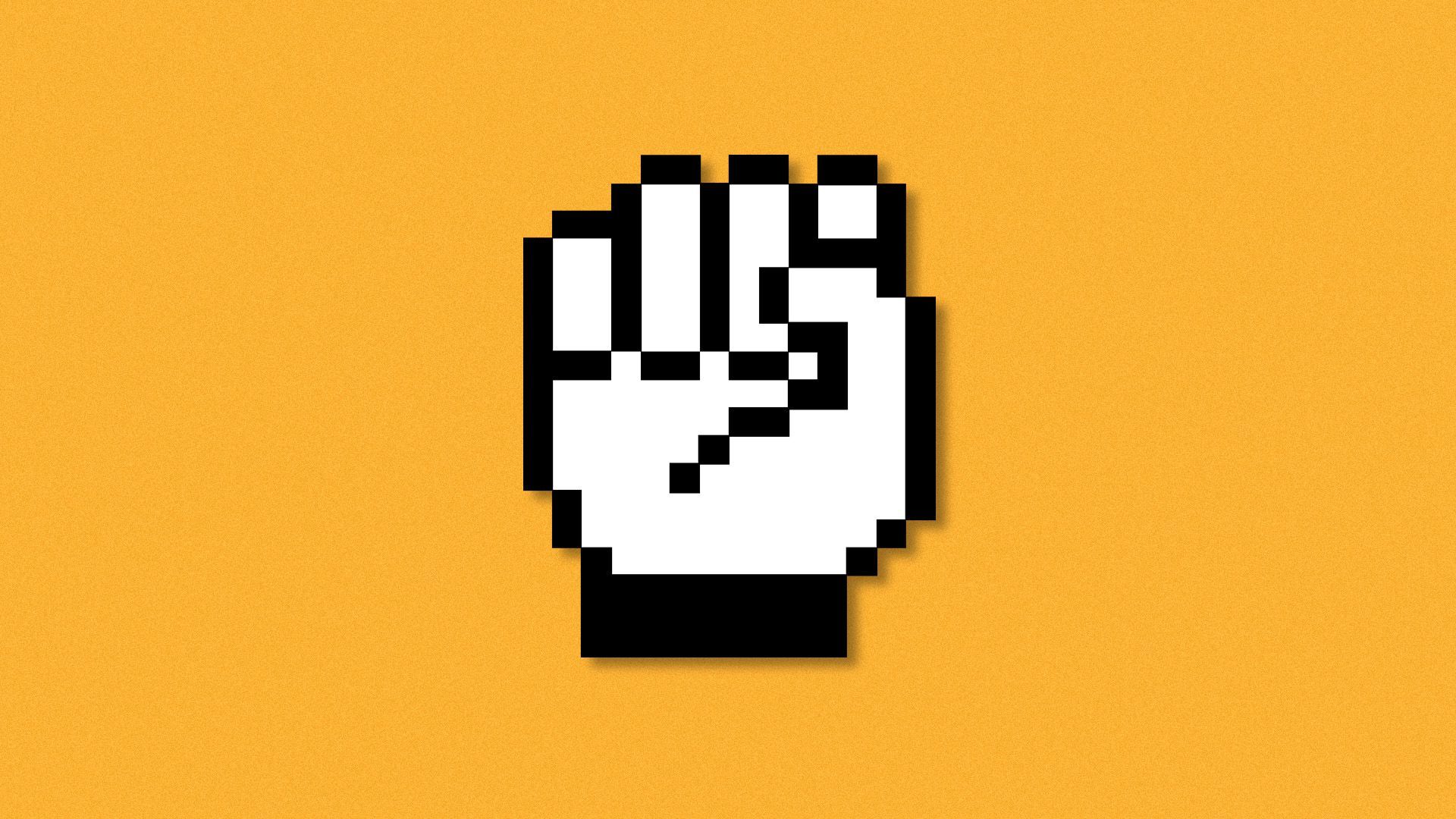 |
|
| Illustration: Annelise Capossela/Axios |
| |
| Germany wants to give people a legal right to work from home, Axios' Erica Pandey reports. Why it matters: The proposal is a testament to how far the world has come amid the coronavirus pandemic, with the once-fringe idea of telecommuting finding a place in the law books. The backdrop: Germany was ahead of other countries on telework even before the pandemic, the World Economic Forum notes. 40% of Germans wanted to work from home at least part time, which was a much higher share than that in other wealthy countries. - The regulations Germany is considering include limiting work-from-home hours to address telework's disruption of work-life balance.
- Critics of the law say it could chip away at workers' collective bargaining power or encourage companies to outsource jobs, per the FT.
|
    |
| |
| |
| 7. Stories we're watching |
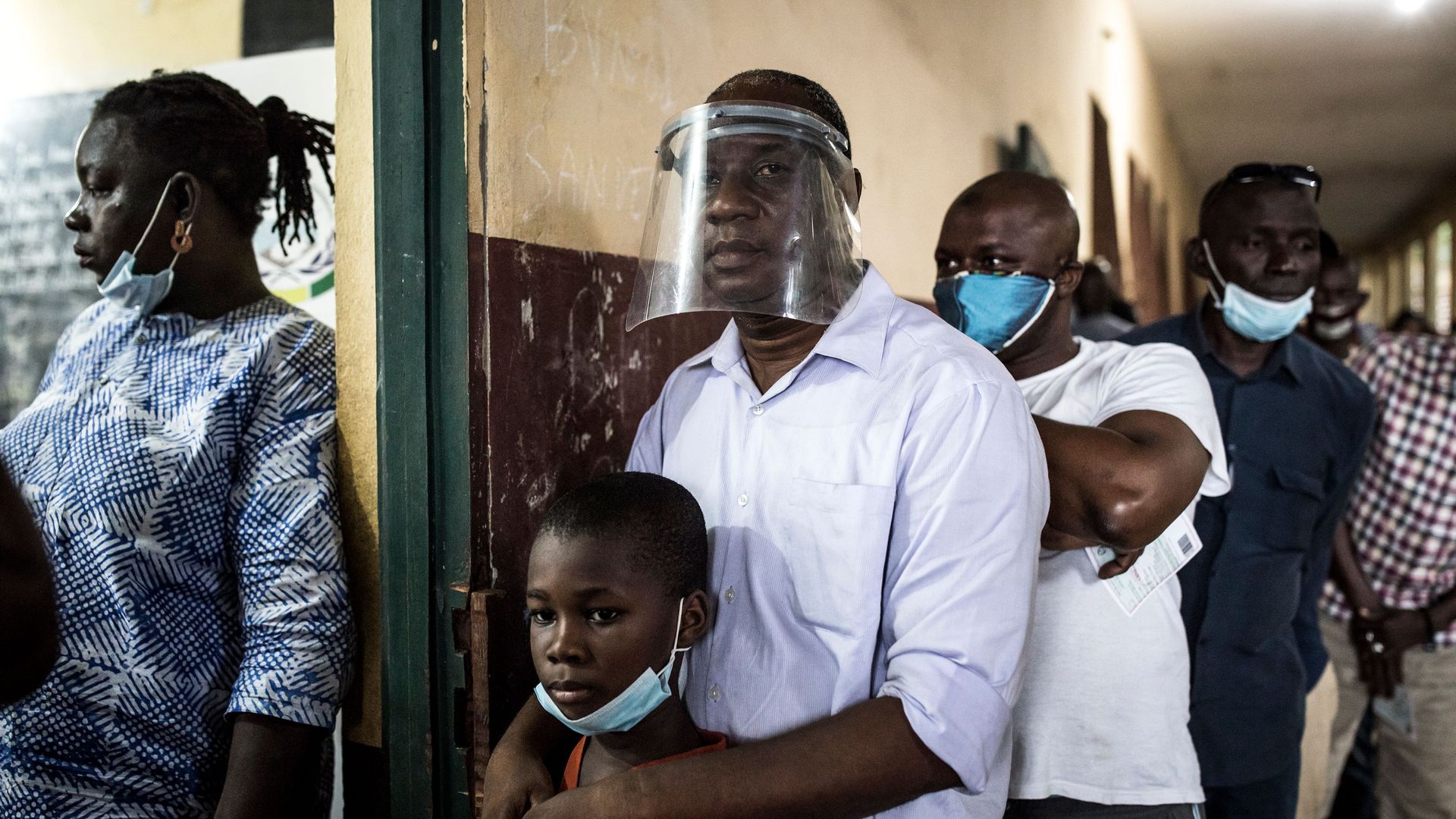 |
|
| Voting in Guinea on Sunday. Results have yet to be announced. Photo: John Wessels/AFP via Getty Images |
| |
- Pandemic update: France and Spain top 1 million cases; Ireland locks down, Sweden defends approach.
- Soldiers fire on protesters in Nigeria
- Bolsonaro endorses Trump
- China embraces hostage diplomacy
- U.S.-China climate rupture
- U.S. officials: Iran and Russia interfering in election
- Goldman Sachs settles Malaysian bribery case
"I stood up for that." — Pope Francis voicing his support for same-sex civil unions for the first time as pope |
    |
| |
| |
| A message from the U.S. Air Force Rapid Sustainment Office (RSO) |
| U.S. Air Force holds event to identify emerging technologies |
| |
 |
| |
| The U.S. Air Force's Advanced Manufacturing Olympics is helping translate innovative ideas into enduring solutions for the defense industry. The free virtual event has: - Keynote sessions.
- Networking opportunities.
- Live technical competitions.
And more. Watch now. |
| |











No comments:
Post a Comment